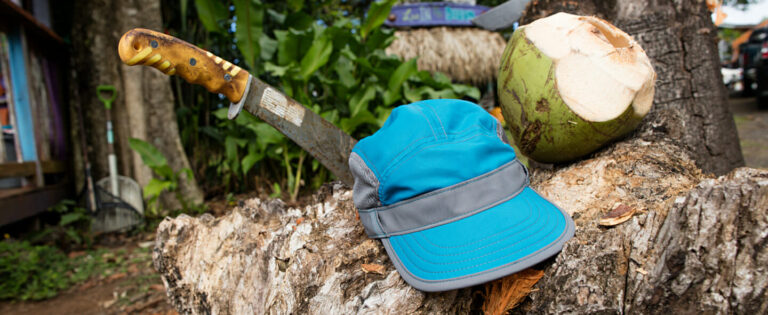
“Why are you lying around the house again? Didn’t feel like going on? No, got diarrhoea…I guess the water wasn’t as clean as I thought it was…”
It’s not at all rare to hear these or similar stories from fellow outdoorsmen who cut their trip short. Unfortunately, when you’re in the great outdoors – be it a multi-day trek, a climbing trip or an expedition to Africa – water and water purification is one of the most important factors. There’s simply no way around it. After all, a whopping three-quarters of all illnesses are water-borne – yikes!
In order to reduce the risk of you contracting water-borne diseases, please have a good, hard think about the following: first and foremost, use common sense. I mean, nobody in their right mind would drink standing muddy water willingly, right? So, you shouldn’t either! But, what about when you’re trekking through meadows and cultivated land and come upon a little innocent stream? Oh yeah, totally drink the stream water. It looks drinkable. Go for it. Yeah…I know what you’re thinking. You shouldn’t have taken that sip, right? Even in seemingly clear stream water, there are loads of invisible risks that can ruin a trip. You said it: Montezuma’s revenge!
The different types of impurities in water
In a nutshell, there are three different types of impurities present in water:
Dirt or suspended solids
- Undissolved particles and sediment
Micro-organisms
- Bacteria like e-coli or salmonella (approx. 0.2-5 microns in size)
- Virus like hepatitis A (~0.02 – 0.2 microns in size)
- Protozoa like giardia (approx. 1-15 microns in size)
Agricultural resources
- Like fertiliser, pesticides or herbicides
How can I purify my drinking water
Boiling – the easiest and oldest method
If the water is somewhat clear and not too cloudy, then you can use the oldest and simple method: simply boil the water. This is a very effective way to combat the various pathogens, but chemicals and suspended particles remain.
At sea level, you should boil the water for at least five minutes. If you’re planning a trip to the mountains, you’ll have to boil the water longer, since the boiling point of water gets lower with higher altitude. As a rule of thumb: increase the boiling time by 1 minute for every 150 metres of elevation gain.
And that brings us to the biggest downside of boiling. You need fuel, and a lot of it, especially for long trips or large amounts of water. To reduce the amount of fuel required and to filter out the suspended particles and chemicals in the water, there is a variety of other water purification techniques you can use. The most important water purification methods are:
Using chemicals
such as Micropur Forte (only available on our German website)
- How does Micropur Forte work? The microorganisms are killed chemically by silver ions or chlorine. One gram of powder is enough for 100 litres of water!
- What does it combat? Bacteria, viruses, most protozoa and fungi
- What is the dosage? One 100g-pack of powder treat 10,000 litres of water
- How heavy is the package? 100 grams
- What is it good for? For clear, but potentially contaminated water; when the water is stored
+ easy to use
+ conserves the drinking water for up to 6 months
– only works with clear water
– does not combat suspended particles or chemicals
– chemical taste (use Katadyn Antichlorine to neutralise the taste of chlorine)
– takes a long time to take effect
Using UV light

such as with the Steripen Classic
- How does the treatment work? Uses UV light to inactivate micro-organisms, but doe not destroy them.
- What does the treatment using UV light combat? Bacteria, viruses and protozoa
- What is the dosage? The device generates 100 litres of sterilised water per battery charge
- How heavy is the Steripen? 97 grams without batteries
- What is it good for? If you need it to go fast and don’t need large amounts of water.
+ effectively combats viruses
+ easy to use
+ quick purification of water
– you need batteries
– does not filter out suspended particles or chemicals
– only works with clear water
Water filter

such as the MSR Miniworks
- How does a water filter work? Mechanically – the contaminants are removed from the water with the help of the filter unit (usually made of ceramic, fibreglass, plastic, activated charcoal or a combination thereof). Activated charcoal filters chemicals such as pesticides, chlorine and other things while improving the taste as well. High-quality ceramic filters have a pore size of 0.2 microns, so all micro-organisms that are larger than 0.2 microns are removed.
- What does it combat? Bacteria, protozoa, suspended solids and chemicals
- What is the dosage? 2,000 litres – then you’ll have to replace the ceramic cartridge. Of course, you’ll have to sand it or clean it every once in a while as well.
- How heavy is the MSR Miniworks? 456 grams
- What is it good for? Very cloudy water; frequent and heavy use
+ filters suspended particles, bacteria, protozoa as well as chemicals out of the water
+ can quickly treat a large amount of water
– relatively heavy
– viruses are not filtered out
Summary
The way in which you ultimately purify your water depends on the kind of trip you’re planning and your destination. Sometimes, it’s wise to combine various methods. If you’re on a hut-to-hut trip in the Alps and would like to fill up your water bottle in a stream without running the risk of getting sick, your best bet would probably be a Steripen. When you make it to the hut, there’ll be purified water or a bottled isotonic drink waiting for you, anyway.
If you want to safely disinfect water in your campervan water tank and store it for a long period of time, chemicals would be your best choice. Antichlorine will help get rid of the bad taste as well.
If trekking is more your thing, a mechanical water filter is definitely a good choice. It will allow you to purify large amounts of water in a short period of time. The good thing about this is that you won’t have to worry about any electronics breaking or your water tasting like chlorine or other chemicals. The downside is you’ll have a bit more to carry.




